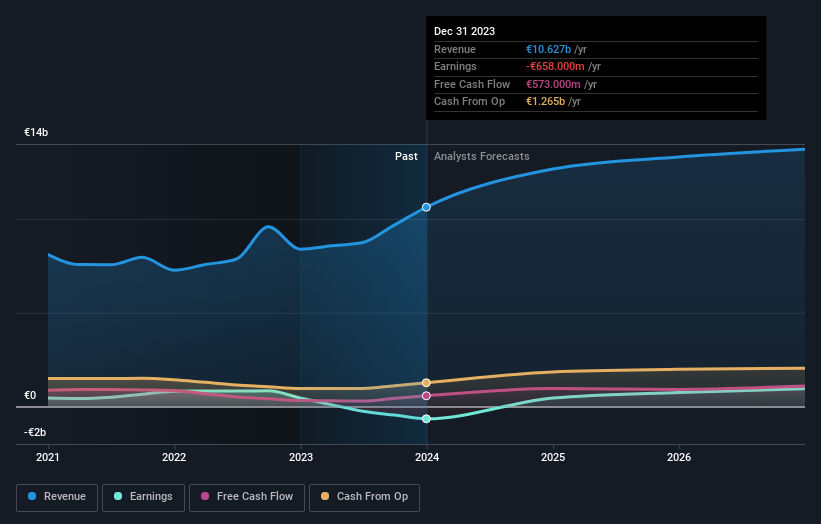Stock Analysis
- Netherlands
- /
- Chemicals
- /
- ENXTAM:DSFIR
DSM-Firmenich AG (AMS:DSFIR) is largely controlled by institutional shareholders who own 37% of the company

Key Insights
- Given the large stake in the stock by institutions, DSM-Firmenich's stock price might be vulnerable to their trading decisions
- A total of 25 investors have a majority stake in the company with 48% ownership
- Insider ownership in DSM-Firmenich is 27%
A look at the shareholders of DSM-Firmenich AG (AMS:DSFIR) can tell us which group is most powerful. With 37% stake, institutions possess the maximum shares in the company. In other words, the group stands to gain the most (or lose the most) from their investment into the company.
Since institutional have access to huge amounts of capital, their market moves tend to receive a lot of scrutiny by retail or individual investors. Therefore, a good portion of institutional money invested in the company is usually a huge vote of confidence on its future.
Let's take a closer look to see what the different types of shareholders can tell us about DSM-Firmenich.
View our latest analysis for DSM-Firmenich

What Does The Institutional Ownership Tell Us About DSM-Firmenich?
Many institutions measure their performance against an index that approximates the local market. So they usually pay more attention to companies that are included in major indices.
We can see that DSM-Firmenich does have institutional investors; and they hold a good portion of the company's stock. This implies the analysts working for those institutions have looked at the stock and they like it. But just like anyone else, they could be wrong. If multiple institutions change their view on a stock at the same time, you could see the share price drop fast. It's therefore worth looking at DSM-Firmenich's earnings history below. Of course, the future is what really matters.

We note that hedge funds don't have a meaningful investment in DSM-Firmenich. The company's largest shareholder is Norges Bank Investment Management, with ownership of 4.9%. BlackRock, Inc. is the second largest shareholder owning 3.3% of common stock, and Summit Trust International SA, Asset Management Arm holds about 3.1% of the company stock.
On studying our ownership data, we found that 25 of the top shareholders collectively own less than 50% of the share register, implying that no single individual has a majority interest.
Researching institutional ownership is a good way to gauge and filter a stock's expected performance. The same can be achieved by studying analyst sentiments. There are a reasonable number of analysts covering the stock, so it might be useful to find out their aggregate view on the future.
Insider Ownership Of DSM-Firmenich
The definition of company insiders can be subjective and does vary between jurisdictions. Our data reflects individual insiders, capturing board members at the very least. Company management run the business, but the CEO will answer to the board, even if he or she is a member of it.
Most consider insider ownership a positive because it can indicate the board is well aligned with other shareholders. However, on some occasions too much power is concentrated within this group.
Our information suggests that insiders maintain a significant holding in DSM-Firmenich AG. It has a market capitalization of just €28b, and insiders have €7.6b worth of shares in their own names. That's quite significant. Most would be pleased to see the board is investing alongside them. You may wish to access this free chart showing recent trading by insiders.
General Public Ownership
The general public-- including retail investors -- own 35% stake in the company, and hence can't easily be ignored. While this size of ownership may not be enough to sway a policy decision in their favour, they can still make a collective impact on company policies.
Next Steps:
It's always worth thinking about the different groups who own shares in a company. But to understand DSM-Firmenich better, we need to consider many other factors. For instance, we've identified 2 warning signs for DSM-Firmenich that you should be aware of.
Ultimately the future is most important. You can access this free report on analyst forecasts for the company.
NB: Figures in this article are calculated using data from the last twelve months, which refer to the 12-month period ending on the last date of the month the financial statement is dated. This may not be consistent with full year annual report figures.
Valuation is complex, but we're helping make it simple.
Find out whether DSM-Firmenich is potentially over or undervalued by checking out our comprehensive analysis, which includes fair value estimates, risks and warnings, dividends, insider transactions and financial health.
View the Free AnalysisHave feedback on this article? Concerned about the content? Get in touch with us directly. Alternatively, email editorial-team (at) simplywallst.com.
This article by Simply Wall St is general in nature. We provide commentary based on historical data and analyst forecasts only using an unbiased methodology and our articles are not intended to be financial advice. It does not constitute a recommendation to buy or sell any stock, and does not take account of your objectives, or your financial situation. We aim to bring you long-term focused analysis driven by fundamental data. Note that our analysis may not factor in the latest price-sensitive company announcements or qualitative material. Simply Wall St has no position in any stocks mentioned.

Simply Wall St
About ENXTAM:DSFIR
DSM-Firmenich
DSM-Firmenich AG provides solutions for nutrition, health, and beauty businesses in the Switzerland, Netherlands, rest of Europe, the Middle East and Africa, North America, Latin America, China, and rest of Asia.
Excellent balance sheet with moderate growth potential.
